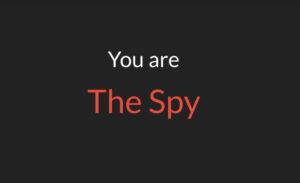Critical Play – Bluffing, Judging and Getting Vulnerable…
For this first critical play, I chose to play a childhood favorite, Spyfall. Similar to games we’ve played in class like Mafia and One Night Werewolf, Spyfall is a social dedication game. Spyfall was initially created by Alexandr Ushan and published as a card game, but has since been published into online formats. I played the online version through the netgames.io platform. The target audience of the game is a friend group (or group of strangers) of any age, looking for an easily accessible and easy-to-understand game.
Playing this game again for the first time since middle school brought back many memories. My experience playing this game highlighted how I tended to engage in more critical thinking when I was not the spy and I tended to be more expressive in my communication style when I was the spy.
In my experience playing as the spy, as soon as I dragged down on the screen that revealed my spy identity, I tuned in to the responses and facial expressions of other players.

When I noticed slightly confused expressions on their faces, I said aloud “hmm interesting,” because I thought that making a bolder move earlier on would help disguise my identity. As the spy, my objective was to just figure out what the location was. If I could do that, then the outcome would end with my victory! My resources were the other players: the questions they asked, their responses to other players’ questions, and their facial expressions/mannerisms if they were trying to communicate some things nonverbally. Because the game uses a unilateral competition structure among players, as the spy, I was motivated to assimilate into the group and copy / simulate other players’ mannerisms. When other players asked questions like, “How many windows would you expect to see in this location” which focused on physical aspects, I also centered my questions about physical aspects.
Additionally, on the topic of decision making, I noticed that I tended to spend less time thinking of questions and responses as the spy. Since the rules of the game are that you can only ask questions to each other about the location, most players are brainstorming their questions while other players are engaged in conversation. As the spy, I felt that if I took too long to ask a question or answer a question, it would give my identity away. As such, I tended to limit my decision making time to avoid suspicion, even if it meant that the question/response I gave was riskier. By contrast, as a non-spy, my objective was to balance the amount of description I gave without making it too obvious, and my decision time tended to be longer and my responses tended to be more vague than when I was the spy.
A key ethics concern regarding social deduction games is its incorporation of lying and bluffing as core mechanics. In Spyfall, only the spy must bluff as the rounds go on and they are asked questions about the location. I would argue that with a game like Spyfall, the lying/bluffing is more low stakes in the sense that the game flow is mediated well through the mechanic and procedure that people only go around and ask each other questions. In my experience playing Spyfall, no one ever gets heated or has to vigorously defend themselves or try to place the blame on other people. The harm of this bluffing seems to be very limited. By comparison, with a game like Werewolf, much more lying and high-stakes bluffing is involved, where multiple players might be lying and bluffing, and players are accusing each other and trying to shift the blame around. In my experience playing a bluffing game like Werewolf, players do get heated and often at the end of the game when the actual roles are revealed, people can often feel betrayed by their closest friends or partners when they find out that they were lying the entire time. It seems that the emotional toll and harm of bluffing in Werewolf is perceived as more of a “wrong” action than being the spy in Spyfall.
In general, I feel that most players are cognizant of the “Magic Circle” that is encompassed by the boundaries of a game: even if there is a brief feeling of betrayal experienced by players, it quickly comes to pass after the game is completed. In this sense, I would argue that lying and/or bluffing in a game does not constitute a wrong action if all the players in the game recognize the Magic Circle and know that each player is just playing along the rules of the game. What is special about games is the thrill that they provide us and the sense of achievement when you are able to outwit your counterparts—for players that have experienced this thrill, they might be more open to the idea that they might be lied to by their friends who are also trying to win the game.
In all, I thoroughly enjoyed getting to play Spyfall again after many years. It brought back the same sort of nervousness I experienced as a kid trying to hide my spy identity, while also trying to uncover the different layers of my friends’ questions and responses!



